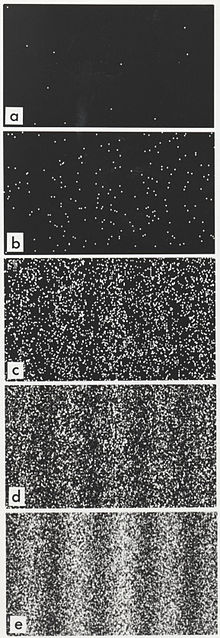Determinism
This is the notion that the past and the present dictate the future entirely and necessarily by rigid natural laws and that every occurrence inevitably results from prior events.[10][11] The concept is often argued by invoking causal determinism, implying that there is an unbroken chain of prior occurrences stretching back to the origin of the universe.[29] Meaning the causal set of events leading to the present are all valid yet appear as a singular linear time stream within a much broader unseen conic probability field of other outcomes that "split off" from the locally observed timeline.The interpretation sidesteps the exclusive retrospective causal chain problem of "could not have done otherwise" by suggesting "the other outcome does exist" in a set of parallel universe time streams that split off when the action occurred.This theory is sometimes described with the example of agent based choices but more involved models argue that recursive causal splitting occurs with all wave functions at play.Chilean biologists Humberto Maturana and Francisco Varela popularized the notion, writing that a living system's general order is maintained via a circular process of ongoing self-referral, and thus its organization and structure defines the changes it undergoes.On an individualistic level, what this means is that human beings as free and independent entities are triggered to react by external stimuli or change in circumstance.Additionally, they also criticize the notion for overemphasizing deterministic forces such as structure over the role of human agency and the ability of the people to act.These critics argue that politicians, academics, and social activists have the capability to bring about significant change despite stringent structural conditions.The Dutch philosopher Baruch Spinoza was a determinist thinker, and argued that human freedom can be achieved through knowledge of the causes that determine desire and affections.For the Dutch philosopher, acting out of one's own internal necessity is genuine freedom while being driven by exterior determinations is akin to bondage.Some of the main philosophers who have dealt with this issue are Marcus Aurelius, Omar Khayyam, Thomas Hobbes, Baruch Spinoza, Gottfried Leibniz, David Hume, Baron d'Holbach (Paul Heinrich Dietrich), Pierre-Simon Laplace, Arthur Schopenhauer, William James, Friedrich Nietzsche, Albert Einstein, Niels Bohr, Ralph Waldo Emerson and, more recently, John Searle, Ted Honderich, and Daniel Dennett."[53] Determinism in the West is often associated with Newtonian mechanics/physics, which depicts the physical matter of the universe as operating according to a set of fixed laws.However, old western scientists believed if there are any logical connections found between an observed cause and effect, there must be also some absolute natural laws behind.Throughout history, the belief that the entire universe is a deterministic system subject to the will of fate or destiny has been articulated in both Eastern and Western religions, philosophy, music, and literature.[60] In the I Ching and philosophical Taoism, the ebb and flow of favorable and unfavorable conditions suggests the path of least resistance is effortless (see: Wu wei).The Jains hold an atomic view of reality, in which particles of karma form the fundamental microscopic building material of the universe.[63][64][65] The oldest descriptions of the Ājīvika fatalists and their founder Gosāla can be found both in the Buddhist and Jaina scriptures of ancient India.[63][65] The predetermined fate of all sentient beings and the impossibility to achieve liberation (mokṣa) from the eternal cycle of birth, death, and rebirth (saṃsāra) was the major distinctive philosophical and metaphysical doctrine of this heterodox school of Indian philosophy,[63][64][65] annoverated among the other Śramaṇa movements that emerged in India during the Second urbanization (600–200 BCE).[66][67] In traditional Buddhist philosophy, this concept is used to explain the functioning of the eternal cycle of birth, death, and rebirth (saṃsāra); all thoughts and actions exert a karmic force that attaches to the individual's consciousness, which will manifest through reincarnation and results in future lives.[75] Many biologists do not grant determinism: Christof Koch, for instance, argues against it, and in favour of libertarian free will, by making arguments based on generative processes (emergence).[76] Other proponents of emergentist or generative philosophy, cognitive sciences, and evolutionary psychology, argue that a certain form of determinism (not necessarily causal) is true.[77][78][79][80] As an illustration, the strategy board-games chess and Go have rigorous rules in which no information (such as cards' face-values) is hidden from either player and no random events (such as dice-rolling) happen within the game.By this analogy, it is suggested, the experience of free will emerges from the interaction of finite rules and deterministic parameters that generate nearly infinite and practically unpredictable behavioural responses.Taken in isolation (rather than as an approximation to quantum mechanics), Newtonian physics depicts a universe in which objects move in perfectly determined ways.At the scale where humans exist and interact with the universe, Newtonian mechanics remain useful, and make relatively accurate predictions (e.g. calculating the trajectory of a bullet).Physicist Aaron D. O'Connell explains that understanding the universe, at such small scales as atoms, requires a different logic than day-to-day life does.[87] This is where statistical mechanics come into play, and where physicists begin to require rather unintuitive mental models: A particle's path cannot be exactly specified in its full quantum description.Put another way: personal computers, Blu-ray players and the Internet all work because humankind discovered the determined probabilities of the quantum world.Instead, the light arrives in varying concentrations at widely separated points, and the distribution of its collisions with the target can be calculated reliably.


Determinism (disambiguation)FatalismPredeterminismPredictabilityTheological determinismPhilosophyOutlineGlossaryHistoryAncientAncient EgyptianAncient GreekMedievalRenaissanceModernContemporaryAnalyticContinentalAfricanEthiopiaSouth AfricaEastern philosophyChineseIndianIndonesiaVietnamIndigenous AmericanAztec philosophyMiddle Eastern philosophyIranianWesternAmericanBritishFrenchGermanItalianRussianBy religionBuddhistConfucianChristianIslamicJewishTaoistEpistemologyEthicsMetaphysicsAestheticsEducationLanguageMetaphilosophyOntologyPhenomenologyPoliticalReligionSciencePhilosophersAesthetic philosophersEpistemologistsEthicistsLogiciansMetaphysiciansPhilosophers of mindSocial and political philosophersWomen in philosophystatisticsProbability theoryProbabilityAxiomsSystemIndeterminismRandomnessProbability spaceSample spaceCollectively exhaustive eventsElementary eventMutual exclusivityOutcomeSingletonExperimentBernoulli trialProbability distributionBernoulli distributionBinomial distributionExponential distributionNormal distributionPareto distributionPoisson distributionProbability measureRandom variableBernoulli processContinuous or discreteExpected valueVarianceMarkov chainObserved valueRandom walkStochastic processComplementary eventJoint probabilityMarginal probabilityConditional probabilityIndependenceConditional independenceLaw of total probabilityLaw of large numbersBayes' theoremBoole's inequalityVenn diagramTree diagramphilosophicaluniversecausallyeternalismfree willcompatibleantonymcompatibilismincompatibilismself-determinationpredictionhistorical determinismpath dependenceself-causedthought experimentLaplace's demon